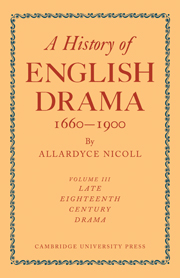Chapter Two - TRAGEDY
Published online by Cambridge University Press: 05 March 2012
Summary
General Tendencies of the Period
As the drama of the period 1700–1750 was characterised by the gradual growth and ultimate dominance of the pseudo-classic precepts, so this is marked out by the gradual emergence of romantic principles. Already it has been seen how the conflict between Augustan ideals and the newer spirit affected the settings, the costumes and the acting of plays; an effort must now be made to trace its influence on the dramatic literature of the period. Classicism, of course, even to the last years of the eighteenth century still held its own in spite of the revolutionary poetry of a Chatterton, a Burns and a Blake. The formal rules of the Augustan critics were still regarded by most as divinely inspired and even the writers of sentimental comedy bowed to their authority. It is perhaps natural that Dodsley should keep to a strict limitation of time in his Cleone (C.G. 1758), but we are somewhat surprised to find Cumberland indicating in The Carmelite (D.L. 1784) and in The Natural Son (D.L. 1785) that the “Time” is “that of the Representation,” MacNally noting down “Time, One Day” in his Fashionable Levities (C.G. 1785) and Mrs Inchbald triumphantly drawing the attention of her readers to the fact that she has preserved the Unity of Time in Lovers' Vows (C.G. 1798).
- Type
- Chapter
- Information
- A History of English Drama 1660-1900 , pp. 49 - 107Publisher: Cambridge University PressPrint publication year: 1952



